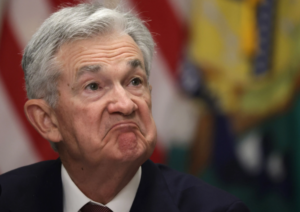$SPX $DOGE $AMZN
#StockMarket #Investing #Crypto #Doge #RetailInvestors #Tariffs #GrowthScare #Economy #Stocks #MarketNews #Finance #Trading
The markets are experiencing a wave of uncertainty as concerns over slowing economic growth take precedence over fears of new tariffs. Investors have been grappling with weaker economic data, leading to a “growth scare” that has dominated market sentiment. Recent manufacturing and services reports suggest a cooling expansion, reinforcing the notion that economic momentum is softening. This trend has put pressure on equities, with major indices showing increased volatility. While tariffs remain a looming threat, particularly with ongoing geopolitical tensions, investors are currently more focused on the broader economic slowdown. This has led to a movement towards safer assets, with bond yields dipping and defensive sectors seeing inflows.
Retail investor sentiment has also taken a hit amid these concerns. Many individual traders who had been active during the bull market now appear to be retreating as economic uncertainty rises. The sell-off in high-growth stocks and speculative assets indicates a shift in risk appetite. While institutional investors are still positioning portfolios in response to potential tariff impacts, retail investors seem to be reacting more strongly to fears of an economic slowdown. This pullback from riskier assets adds another layer of pressure to the market, particularly on technology and consumer discretionary stocks. Amazon, for instance, has faced selling pressure as concerns grow over consumer spending trends. The shift in investor sentiment underscores a more cautious approach to equities in the near term.
In the crypto space, Dogecoin ($DOGE) has seen turbulence, particularly following reports of job cuts in companies with exposure to the meme-based cryptocurrency. The broader crypto market is already dealing with a period of consolidation after a strong rally earlier in the year. Dogecoin, which is often influenced by retail-driven speculation, has struggled to maintain momentum amid the changing macroeconomic landscape. Job cuts in crypto-linked firms suggest a recalibration within the industry, with companies tightening operations to navigate a less exuberant market environment. While major cryptocurrencies like Bitcoin and Ethereum maintain relative stability, smaller and more speculative assets have seen increased volatility.
Looking ahead, market participants will continue to monitor economic data closely to gauge the severity of the slowdown. Upcoming inflation reports, employment numbers, and Federal Reserve commentary will provide further clarity on how policymakers may respond. If economic conditions worsen, expectations for rate cuts in the future could galvanize markets, but persistent inflation could complicate central bank decisions. At the same time, the tariff debate remains in the background, with potential policy moves capable of adding another layer of market uncertainty. Until more clarity emerges, investors should brace for continued volatility and shifting sentiment across both traditional and digital asset markets.







Comments are closed.